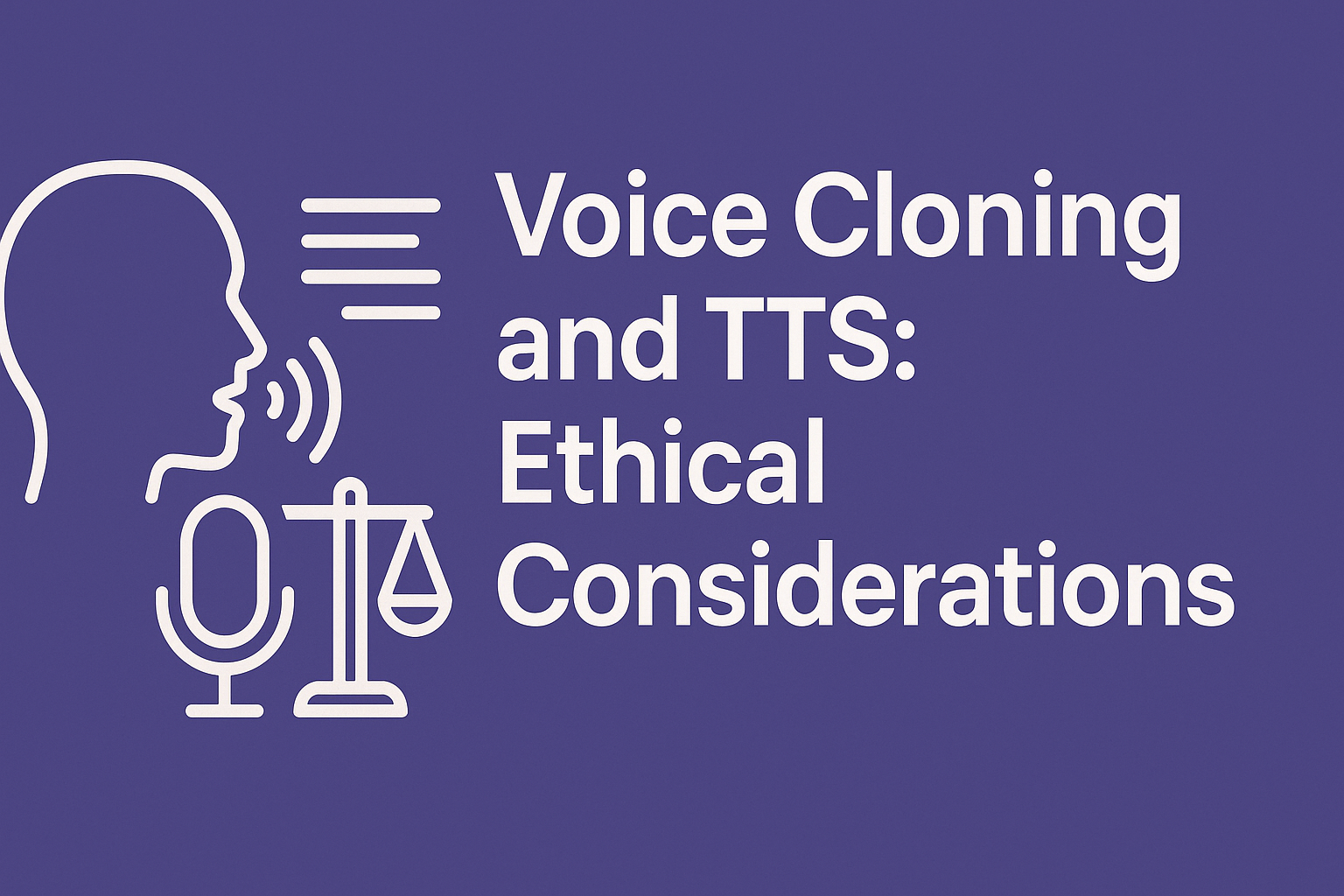Voice cloning and text-to-speech (TTS) technologies are transforming how we interact with digital content, offering lifelike audio experiences at scale. Their applications are powerful and inspiring, from personalized assistants to creative storytelling.
As these tools become more advanced and accessible, it’s important to understand the ethical responsibilities that come with their use.
In this blog, we’ll explore how voice cloning and TTS shape communication and why transparency, consent, and integrity should guide every step of innovation in this space.
Understanding Voice Cloning in the Context of TTS

Voice cloning in TTS means creating a digital copy of a real person’s voice using AI. Unlike standard TTS, which uses generic voices, voice cloning captures the unique tone, pitch, and speaking style of a person.
AI listens to audio samples and learns speech patterns to generate realistic voice output that sounds just like the original speaker. This process uses deep learning and neural networks to match natural rhythms and emotions in speech.
It’s widely used in voice assistants, audiobooks, and digital avatars to create personalized and engaging experiences. Voice cloning helps brands, creators, and developers add a human touch to their content, making it feel more natural and expressive.
Major Ethical Issues in Voice Cloning and TTS
1. Consent and Voice Ownership
Voice cloning must be backed by explicit permission from the original speaker. Legal challenges arise when defining who owns a digital replica of a voice—creator, user, or the original voice actor.
2. Deepfakes and Misinformation
Cloned voices can be used in audio deepfakes to spread false information, impersonate public figures, or commit fraud. Cases like AI-generated scam calls highlight real-world dangers and regulatory gaps.
3. Privacy and Data Security
Stored voice data can be hacked or misused if not properly secured. Ethical use requires encrypted systems, clear data policies, and anonymization to protect user identity and voice integrity.
Responsible Practices for Ethical TTS Deployment
Responsible practices for ethical TTS deployment focus on trust, transparency, and user respect. First, always use clear consent protocols and transparent agreements so people know when TTS is used and how their data is handled.
Labeling or watermarking synthetic voices helps users easily identify AI-generated speech and prevents misuse. It’s also important to define usage boundaries—especially for public-facing or sensitive content—to avoid misleading audiences or harming credibility.
These practices make TTS safer and more reliable for real-world use. When developers follow these ethical steps, it builds confidence among users, keeps communication honest, and helps TTS tools work fairly in everyday life.
How Speechactors Supports Ethical TTS Use?

Speechactors supports ethical TTS use with strong safeguards and clear guidelines.
It only allows the use of trained or approved voice models, so no unauthorized voice cloning is possible. Every user must follow the platform’s terms of use, which are designed to protect both creators and listeners.
Speechactors is built to support good use cases like education, content creation, accessibility, and productivity. This helps teachers, marketers, and creators use voice technology in the right way. The platform checks how voices are used, making sure they follow fair use practices.
These steps keep everything safe, respectful, and useful for everyone. It creates a space where AI voices help people in meaningful and responsible ways.
Frequently Asked Questions (FAQs)
What makes voice cloning different from regular TTS?
Voice cloning uses AI to copy a specific person’s voice, including tone and style, while regular TTS uses generic computer-generated voices. Cloning captures unique speech patterns, making it sound more natural and personalized.
Can someone clone my voice without my permission?
Yes, someone can clone your voice using AI if they get a clear audio sample of it. AI voice cloning tools only need a few seconds of your speech to create a fake voice that sounds just like you.
How does Speechactors prevent unethical voice use?
Speechactors prevents unethical voice use by using strict voice cloning permissions, watermarking technology, and secure API access. Every voice is protected by user agreements, and real-time usage is tracked to avoid misuse or impersonation.
Are there laws governing voice cloning?
Yes, there are laws governing voice cloning. Many countries, including the U.S., treat voice as personal biometric data. Using someone’s voice without permission can violate privacy, copyright, and deepfake-related laws like the DEEPFAKES Accountability Act.
Can voice cloning be used for accessibility?
Yes, voice cloning can improve accessibility by letting people with speech disorders use personalized synthetic voices. It helps them speak in their own style, making communication feel natural and emotionally connected for listeners.
Conclusion
Voice cloning and TTS technologies raise urgent ethical concerns around consent, misuse, and identity protection. As AI-generated audio becomes more realistic, the responsibility to use it wisely grows stronger.
From securing user permissions to preventing deepfake misuse, developers and users must act with integrity. At Speechactors, we’re deeply committed to building TTS solutions that prioritize safety, authenticity, and user trust.
As you explore the power of AI voice, choose tools that are built with ethical safeguards. Let’s create a future where innovation respects identity—start responsibly with Speechactors today.
